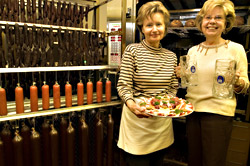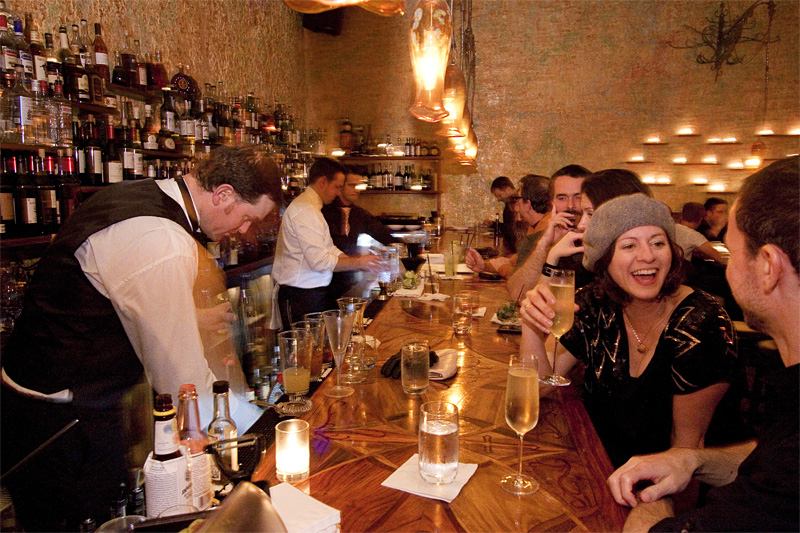Seattle’s foodies started in on me within days of my arrival in town this July. “Have you been to Salumi yet?” “Hey, have you tried Armandino Batali’s restaurant?” “You simply must go to Salumi.”
Over the past five years, the salumi (Italian cured meats) craze, not just the Salumi craze, has sent scores of chefs around the nation to libraries and butcher shops to figure out just how long to air-dry prosciutto and salt-cure lomo. It’s one of the few food trends I hope will last. So, yeah, I have been to Salumi to try what one acquaintance claims is “meat crack.” But there are a number of other local artisans who also cure salumi, charcuterie, wurst, or whatever they want to call it, not to be overlooked. One sunny weekday a few weeks ago, I revved up the Honda and set out to eat my weight in cured, salted meat.
My first stop was Olsen’s Scandinavian Foods in Ballard (2248 N.W. Market St., 206-783-8288, www.scandinavianfoods.net), where current owners Anita and Reidun Endresen make much of their salumi (for lack of a Norwegian word) with lamb. The rulle polse, or lamb “loaf,” is lean, fine-grained, and delicately spiced, and the tennis ball–sized fåre polse and skinnier, denser mår polse are both smoked lamb salamis. Though hearty, both are smoked so long that they can taste a bit ashy; I prefer the sylte (pork loaf), a gorgeous patchwork of light, dark, and fatty pork meat aromatic with allspice.
Snacking on the sylte and rulle polse, I drove from Ballard to Bellevue—sure, eating in the car is dangerous, but so is downing a pound of cured meat—to Porcella Urban Market (10245 Main St., Ste. 101, Bellevue, 425-286-0080, www.porcellaurbanmarket.com.), where Kelly Gaddis offers jars of luxury condiments, prepared foods, and a panoply of charcuterie. Behind the display case in this warehouse-chic store is Gaddis’ glassed-in cooler, in which you can spy hanging pig legs that should be prosciutto by January. Of all the salumerians whose wares I tried, Gaddis uses the highest ratio of fat to lean. In the finnochiona, hauntingly seasoned with fennel seed, or the paprika-rimed coppa (cured pork shoulder), the high fat content gives the meat a buttery, sensuous texture. When the fat isn’t countered with assertive spicing, as in the duck-breast prosciutto and the salamette, however, the salumi can taste overrich and lardy. You can buy his charcuterie by the pound or order a tasting plate for $12, sprinkled with olives and a drizzle of extra virgin olive oil. Liberace was never so opulent.
After a short break to down a bottle of the universal solvent, Diet Coke, I proceeded to the Salumi Shack, or rather, Cafe da Pino (4225 Rainier Ave. S., 206-725-1772). In a little, unprepossessing house on Rainier Avenue, the brusquely good- natured Pino Rogano mans the counter while cooking pastas and making sausages to sell to restaurants. His sandwiches aren’t stuffed as full of meat as Salumi’s, and not always to good effect; once I rescued my house-cured coppa from the fluffy white roll it was suffocating in, I marveled at the lean, subtly seasoned meat, as translucent as vellum. I left the cafe with a couple of Rogano’s slender dry salame, snowy here and there with mold (the good kind; think brie). Rogano’s crimson-colored Calabrian sausage rushes the palate with garlic, pricklingly hot chiles, and the slight fustiness of a good aged salami. Cured with red wine, the boar salami—wild boar from Texas, Rogano said—contains an even richer, almost fruity flavor (it’s the only product I kept from sharing with my co-workers afterward).
Leaving Rainier Valley, I drove to Hans’ Sausage and Delicatessen in Burien (717 S.W. 148th St., Burien, 206-244-4978). For the past 28 years, the 33-year-old German deli has been housed in the same plaster-and-beam building that looks like it belongs in Munich and/or Albuquerque, but its shelves are free of dust, and even midweek you’ll encounter a line at the counter. Hans Stewin and his son Michael craft 60 different kinds of sausages, salamis, smoked hams, meat loaves, and wieners. Overwhelmed by variety, I asked the counterperson for several of the store’s most popular items. Among those she chose were an herb-and-cream liverwurst—a patélike sausage with the smoothness of cream cheese and the floral scent of sage. Most intriguing was the Lachsschinken smoked ham, fatless and leathery-creamy in texture, its translucent flesh pink-rimmed from the smoke and salted to the core.
On the way back to the office, of course I stopped in at Salumi Artisan Cured Meats (309 Third Ave. S., 206-621 8772, www.salumicuredmeats.com). Though it might not be a household name in the broader community, the Batali family’s tiny Pioneer Square delicatessen is an institution among Seattle foodies. Thanks to that New York Times article last year, its culatello (cured ham) has gone rock star—that is to say, it’s now impossible to encounter in its hometown. I gotta admit it: I, too, love many of the shop’s wares. The marbling in Batali’s salumi is lovely, the meat ground coarsely enough to carry big spice and the chunks of fat big enough to melt voluptuously. I most enjoy the innovative salumi—such as the curry-tinged finocchiona, with its little shocks of whole peppercorns and fennel seeds, and the chocolate-chile-cinnamon mole salami—but even the classics are potently seasoned, if occasionally oversalted.
It was the sodium buildup that finally halted the odyssey six hours in, before I had a chance to hit Bavarian Meats in Pike Place Market, Scandinavian Specialties in Ballard, or the many downtown restaurants whose chefs offer up platters of house-cured lomo and lardo. Brined, cured, and stuffed, I instead headed home for a nap and a gallon of water. After all, I had dinner reservations at 7.






